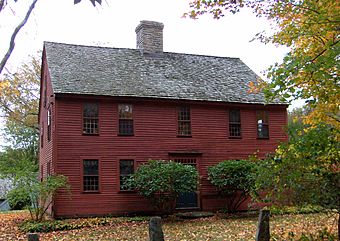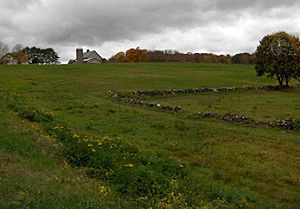Oliver White Tavern facts for kids
Quick facts for kids |
|
|
Oliver White Tavern
|
|
 |
|
| Location | 2 Brandy St., Bolton, Connecticut |
|---|---|
| Area | 2.9 acres (1.2 ha) |
| Built | 1750 |
| Architectural style | Postmedieval English |
| MPS | Rochambeau's Army in Connecticut, 1780-1782 MPS |
| NRHP reference No. | 02000422 |
| Added to NRHP | May 06, 2002 |
The Oliver White Tavern is a very old building in Bolton, Connecticut. It was built around 1750. At first, it was a home, but later it became a popular place called a tavern. A tavern was like a restaurant and hotel where people could eat, drink, and stay the night. This building is special because it shows us what "Georgian architecture" looked like. This is a style of building that was popular a long time ago.
The tavern is also important because of its connection to the American Revolutionary War. A famous French general, Rochambeau, and his army passed by here on their way to a very important battle. Today, the Oliver White Tavern is a private home. It was added to the National Register of Historic Places in 2002.
About the Oliver White Tavern
The old Oliver White Tavern is located just east of Bolton's town center. It sits at the corner of Bolton Center Road and Brandy Street. The house faces west, looking towards the town. Across the street from it is a large open field.
The building is two and a half stories tall. It is made of wood and has a pointed roof. There is a chimney in the middle of the house. The outside walls are covered with overlapping wooden boards called clapboards. The front of the house has five windows. The main door is in the middle. Above the door, there is a window with seven small panes of glass. Simple wooden trim frames the doorway.
History of the Building
The Oliver White Tavern was built around 1750. It is a great example of "Georgian architecture." This style was common for homes back then. Oliver White bought the land where the house stands in 1741. He sold the land and the house in 1743.
The building was used as a home until sometime between 1753 and 1764. Then, it was changed into a tavern. Even though Oliver White no longer owned the building when it became a tavern, it was common to keep the original owner's name. That is why it became known as the Oliver White Tavern.
Rochambeau's Army and the Tavern
The tavern is very important because of its link to the American Revolutionary War. In 1781, the French Army marched from Providence, Rhode Island to Yorktown, Virginia. This march was a big part of the war. They were helping the American colonists fight for their freedom.
Records show that the French army made its fifth camp in the field across from the Oliver White Tavern. A map made by French engineers shows a building at this exact spot. It was marked as a tavern. During that time, soldiers usually camped in open fields. However, the officers often stayed in local taverns or the homes of important people nearby. This means that French officers likely stayed at the Oliver White Tavern during their march.
 | Stephanie Wilson |
 | Charles Bolden |
 | Ronald McNair |
 | Frederick D. Gregory |




